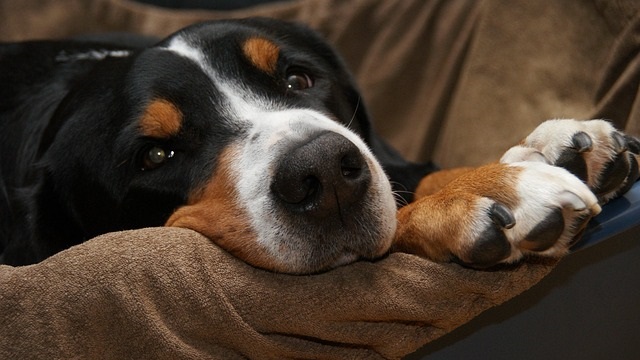Dog Constantly Licking Paws? Causes, Treatment and When To Worry
If you’ve noticed your dog constantly licking their paws, you’re not alone. This behavior can be both confusing and concerning, especially for first-time pet parents. While the occasional lick is normal, persistent or excessive paw licking often signals an underlying issue that shouldn’t be ignored. Understanding why your dog always licks their paws is the first step toward addressing the problem early, before it escalates into something more serious.
This guide walks you through the most common reasons behind paw licking in dogs, when to worry, and how proactive monitoring tools like Maven Pet can help you detect health problems early and respond confidently.
- Excessive paw licking often indicates allergies, irritations, pain, infections, anxiety, or health issues that require attention.
- Maven Pet can monitor paw licking behavior, alerting owners to potential health problems before they escalate.
- Underlying causes include allergies, foreign objects, pain, infections, behavioral issues, and skin conditions.
- Early detection and proactive care are crucial for addressing excessive paw licking and ensuring your dog's health.
Most Common Causes
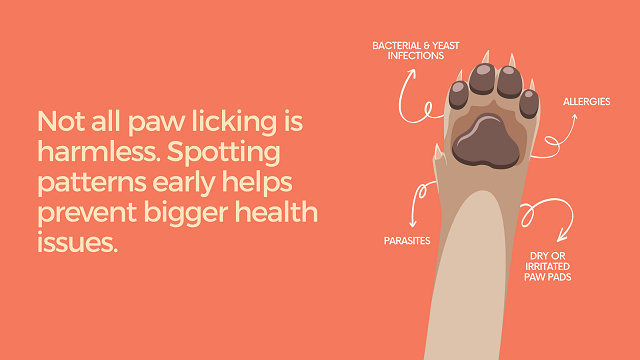
1. Allergies
One of the most common reasons dogs frequently lick their paws is allergies. Dogs can suffer from food allergies, environmental allergens like pollen, dust mites, or even contact allergies from walking on certain surfaces. When your dog experiences an allergic reaction, their paws often become itchy and inflamed, leading to excessive licking.
Allergies are also a common reason for secondary infections, such as bacterial and yeast infections, which can make things worse. According to VCA Animal Hospitals, dogs with allergies will often lick, chew, or bite at their paws persistently.
When to worry: If the licking is paired with red, swollen paws or signs of discomfort, it’s time to take action.
How Maven Pet helps: Maven detects increased itch behavior, including excessive paw licking, and notifies you when it’s outside your dog’s normal range. This gives you a clear signal to check for signs of allergies or schedule a vet appointment.
2. Irritation from Foreign Objects
Sometimes dogs lick their paws because something is stuck between their paw pads, like grass seeds, thorns, or small splinters. Salt or chemicals from sidewalks during winter can also cause skin irritation, leading to obsessive licking.
When to worry: If your dog keeps licking one paw more than the others or limps slightly, check for visible irritants.
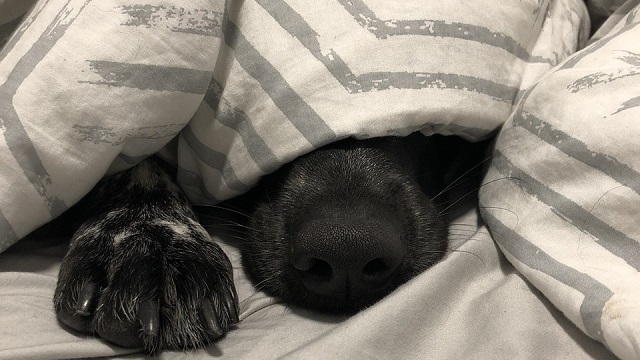
3. Pain and Injuries
Injuries such as cuts, burns, insect bites, or even muscle strain can cause your dog to lick their paws to soothe discomfort. Even arthritis or joint pain can sometimes lead to paw licking.
When to worry: If you notice limping, swelling, or visible wounds, consult your vet promptly.
How Maven Pet helps: Maven continuously tracks changes in your dog’s activity. A decrease in movement or increased nighttime restlessness, paired with paw licking, could suggest discomfort or pain.
4. Bacterial and Yeast Infections
Excessive paw licking can damage the skin barrier, creating an ideal environment for infections to develop. According to the American Kennel Club, infections may present with redness, discharge, or a foul odor.
When to worry: If your dog’s paws smell bad or look inflamed, it’s likely an infection and requires treatment.
“I got the Maven sensor for my 14-year-old Chihuahua mix with heart and trachea issues. It gave me back peace of mind – I can track her RRR, BPM, drinking, and activity anytime and know instantly if something’s wrong. Highly recommend!”

★★★★★
Chiara De Luca
Titti
5. Behavioral Issues or Anxiety
Dogs also lick their paws as a form of self-soothing. This is especially true for dogs left alone for long periods, those with limited stimulation, or those dealing with anxiety. Over time, this behavior can become compulsive.
When to worry: If licking occurs mainly when your dog is bored or stressed, consider this a behavioral concern.
Behavior modification techniques, puzzle toys, and regular exercise can help alleviate boredom-related paw licking. If the problem persists, an animal behaviorist may offer long-term support.
How Maven Pet helps: Maven gives insight into your dog’s sleep and activity trends. If your dog frequently licks at night or shows signs of agitation, it may point to emotional stress. Pet parents can log these behaviors in the app for further analysis.
6. Dry or Irritated Paw Pads
Harsh weather conditions, like extreme heat or cold, can lead to cracked or dry paw pads. Dogs may lick to relieve discomfort caused by dryness or flaking.
When to worry: If you see cracked skin, bleeding, or peeling paw pads, moisturizing balms or booties may help.
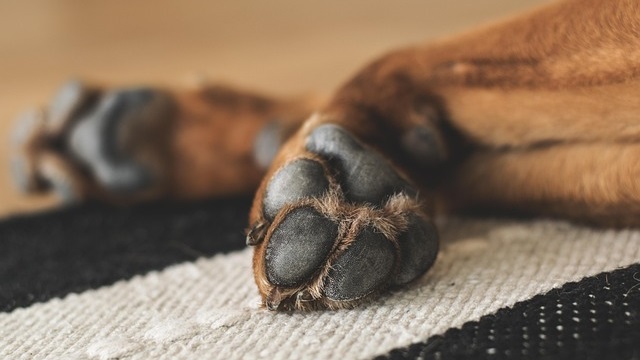
7. Parasites or Skin Mites
Fleas, ticks, and mites can cause itchiness all over the body, including the paws. Mange caused by mites is especially irritating and can lead to excessive paw licking.
When to worry: If the licking is combined with hair loss, scabs, or red spots on other parts of the body, contact your vet.
8. Underlying Health Problems
Sometimes excessive paw licking is a sign of an internal health issue, such as liver disease or hormonal imbalance. These conditions may lead to generalized itching without obvious skin symptoms.
When to worry: If no external cause is found and your dog keeps licking his paws, a vet checkup is essential.
Maven Pet’s Role in Monitoring Excessive Paw Licking
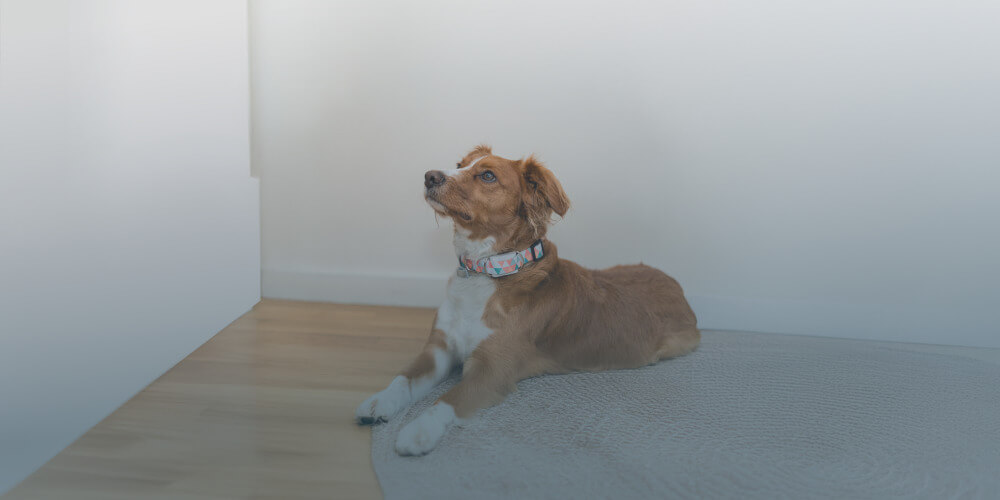
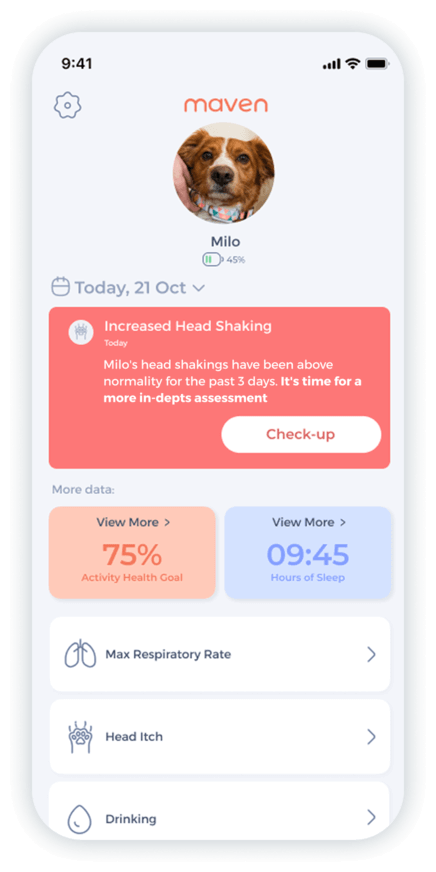
Monitor heart rate, respiratory rate, activity & rest, drinking, itch behavior.
Maven tracks health indicators like itch behavior, sleep patterns, and activity levels. By identifying deviations from your dog’s healthy baseline, Maven helps you detect early signs of discomfort or health concerns. For example, if your dog frequently licks their paws or becomes less active than usual, Maven alerts you.
Plus, the Maven app allows you to log behavioral observations. This data helps your vet make more informed decisions without waiting for visible symptoms to worsen.
What Are Some Treatments for Paw Licking?
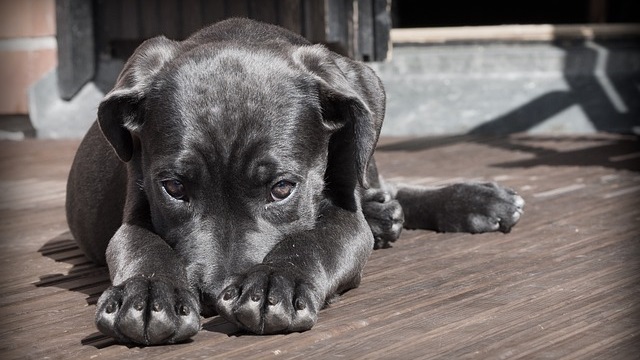
Depending on the cause, treatments may include:
- Topical creams or sprays for infections or inflammation
- A special diet to manage food allergies
- Anti-itch medications prescribed by your vet
- Booties or paw balms for dry paws
- Behavioral training and mental stimulation
Home Remedies for Dog Paw Licking
For minor cases, home remedies can provide relief. But always consult with your veterinarian before starting any treatment.
- Foot soaks with diluted povidone-iodine to clean paws and reduce bacteria
- Oatmeal rinses for soothing irritated skin
Final Thoughts
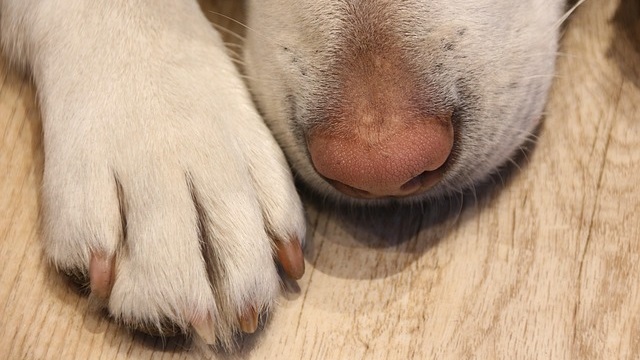
If your dog is continually licking paws, don’t brush it off. Whether it’s due to allergies, injuries, or behavioral issues, this behavior is often a sign that something is off. Early detection and proactive care make all the difference.
With Maven Pet’s smart monitoring system, you can spot subtle behavioral changes before they become serious health problems. Less guessing, fewer bills, and more peace of mind.
Explore how Maven’s dog health tracker helps you stay on top of your dog’s well-being — one paw at a time.
Maven Pet focuses on improving the quality of life of our pets with technology, using artificial intelligence (AI) to enable proactive pet care. By accurately collecting and monitoring pet data 24/7 and flagging any irregularities, Maven Pet empowers pet parents and veterinarians to stay ahead of potential health issues, ensuring the well-being and longevity of our beloved companions.

